-
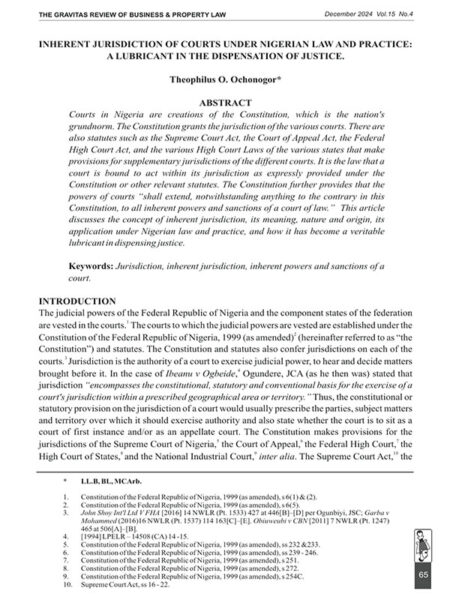
Inherent Jurisdiction of Courts under Nigerian Law and Practice: A Lubricant in the Dispensation of Justice
0₦2,500.00Theophilus Ochonogor in his article, Inherent Jurisdiction of Courts under Nigerian Law and Practice: A Lubricant in the Dispensation of Justice, discusses the concept of inherent jurisdiction, its meaning, nature and origin, its application under Nigerian law and practice, and how it has become a veritable lubricant in the dispensation of justice. Courts in Nigeria are creations of the Constitution, which is the nation’s grundnorm. The Constitution grants the jurisdictions of the various courts. There are also such statutes as the Supreme Court Act, the Court of Appeal Act, the Federal High Court Act and the various High Court Laws of the various states which make provisions for supplementary jurisdictions of the different courts. It is the law that a court is bound to act within its jurisdiction as expressly provided under the Constitution or other relevant statute. The Constitution further provides that the powers of courts “shall extend, notwithstanding anything to the contrary in this Constitution, to all inherent powers and sanctions of a court of law.”
-
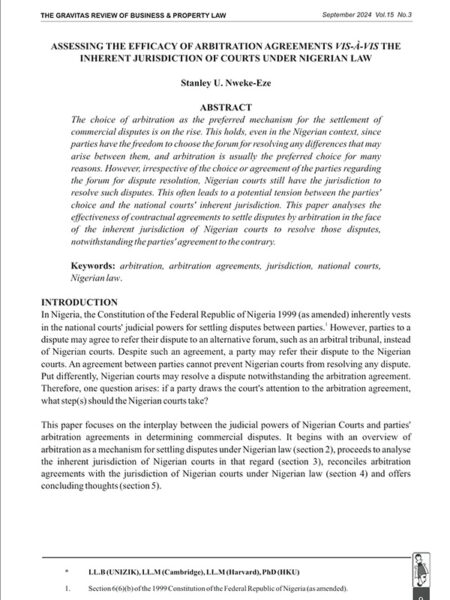
Situating the Efficacy of Arbitration Agreements Vis-à-Vis the Inherent Jurisdiction of National Courts under Nigerian Law
0₦2,500.00Stanley Nweke-Eze, in his article Situating the Efficacy of Arbitration Agreements Vis-à-Vis the Inherent Jurisdiction of National Courts under Nigerian Law, examines the efficacy of Arbitration agreements in the settlement of commercial disputes and the jurisdiction of national courts. The choice of arbitration as the preferred mechanism for the settlement of commercial disputes is on the rise. This holds true, even in the Nigerian context, since parties have the freedom to choose the forum for resolving any differences that may arise between them, and arbitration is usually the preferred choice for a myriad of reasons. However, irrespective of the choice or agreement of the parties regarding the forum for dispute resolution, a party may still invoke the inherent jurisdiction of the Nigerian courts to resolve such disputes. Oftentimes, this leads to a potential tension between the choice of the parties and the inherent jurisdiction of the national courts. Nweke-Eze analyses the effectiveness of contractual agreements to settle disputes by arbitration in the face of the inherent jurisdiction of Nigerian courts to resolve those disputes, notwithstanding the parties’ agreement to the contrary.
-

Revisiting MT Eyuwa vs. Inspector General of Police: The Imposition of “Juridical Personality” on a Ship – A Shibboleth?
0₦2,500.00Dr. Osinuga, in his article, Revisiting MT Eyuwa vs. Inspector General of Police: The Imposition of “Juridical Personality” on a Ship – A Shibboleth? revisits the legal concept of ascribing legal personality to a ship in the light of the recent decision of the Nigerian Court of Appeal in MT Eyuwa v Inspector General of Police, that a ship has legal personality. The article suggests that the concept of a vessel’s legal personality may have been misunderstood by the appellate court.
-
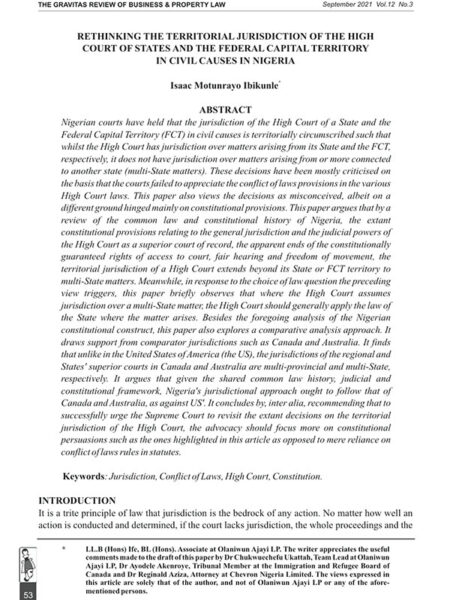
Rethinking the Territorial Jurisdiction of the High Court of States and the Federal Capital Territory in Civil Causes in Nigeria
0₦2,500.00Isaac Ibikunle, Associate at Olaniwun Ajayi LP, in his article, Rethinking the Territorial Jurisdiction of the High Court of States and the Federal Capital Territory in Civil Causes in Nigeria, notes that the extant position of Nigerian courts is that a State High Court does not have jurisdiction over matters arising from or more connected to another state (multi-State matters). He argues that this stance has been criticised because the courts failed to appreciate the conflict of laws provisions in the various High Court laws. From a review of the common law and constitutional history of Nigeria, Ibikunle opines that the territorial jurisdiction of a High Court should extend beyond its State to multi-State matters. He concludes with a recommendation that the Supreme Court should revisit the extant decisions on the territorial jurisdiction of the High Court on multi-State matters by aligning with the Canadian and Australian approaches on the issue.
-
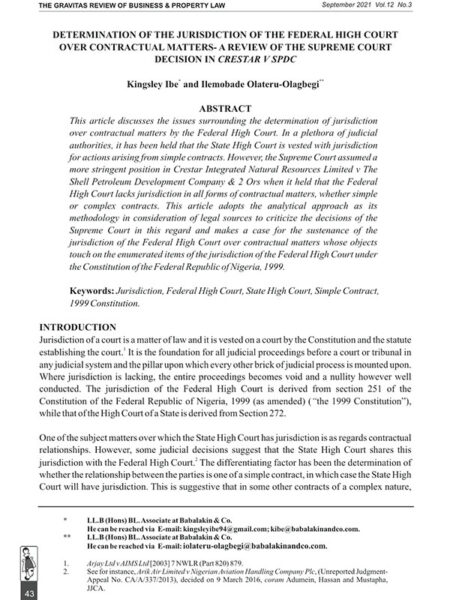
Determination of the Jurisdiction of the Federal High Court Over Contractual Matters- A Review of the Supreme Court Decision in Crestar V SPDC
0₦2,500.00Kingsley Ibe and Ilemobade Olateru-Olagbegi, both of Babalakin & Co, in their article, Determination of the Jurisdiction of the Federal High Court Over Contractual Matters- A Review of the Supreme Court Decision in Crestar V SPDC, examine the incipient confusion over the decision of the Supreme Court that a Federal High Court has no jurisdiction over contractual matters; whether the contract is simple or ‘complex’. They explore the historical jurisdiction of both States and Federal High Court on contracts, and argue that the Federal High Court should still have jurisdiction over contractual matters if the issue pertains to those items enumerated in section 251 of the 1999 Nigerian Constitution.
-
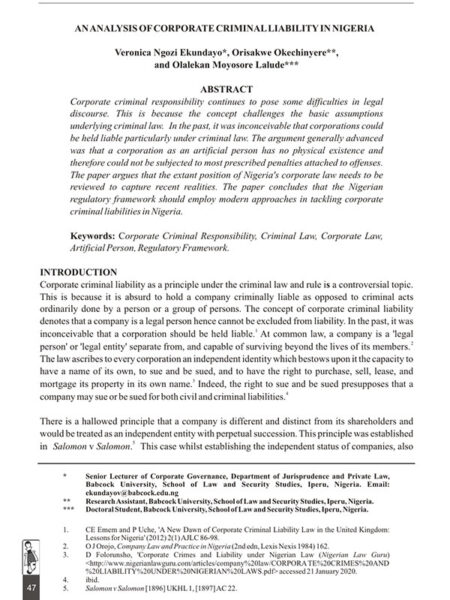
An Analysis of Corporate Criminal Liability in Nigeria
0₦2,500.00Veronica Ekundayo, Orisakwe Okechinyere, and Olalekan Lalude all of the Babcock University, School of Law and Security Studies Iperu Nigeria, in their article An Analysis of Corporate Criminal Liability in Nigeria, examine the concept and jurisprudential underpinnings of corporate criminal liability. They explore Nigerian criminal statutes providing for liability of companies for criminal infractions. They also consider judicial attitude to corporate criminal liability in Nigeria, the practice in other jurisdictions and conclude that the Nigerian regulatory framework should employ modern approaches in tackling corporate criminal liability in the country.
-
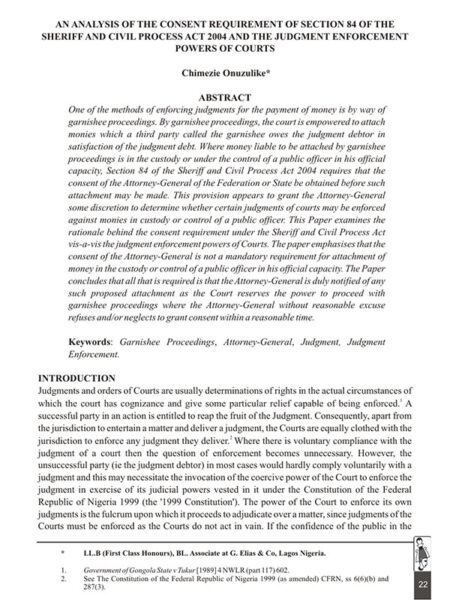
An Analysis of the Consent Requirement of Section 84 of the Sheriff and Civil Process Act 2004 and the Judgement Enforcement Power of Courts
0₦2,500.00Chimezie Onuzulike, Associate at G. Elias & Co in his article An Analysis of the Consent Requirement of Section 84 of the Sheriff and Civil Process Act 2004 and the Judgement Enforcement Power of Courts,notes that where money liable to be attached by garnishee proceedings is in the custody or under the control of a public officer in his official capacity, Section 84 of the Sheriff and Civil Process Act 2004 (SCPA) requires that the consent of the Attorney-General of the Federation or State be obtained before such attachment may be made. This appears to grant the Attorney-General some discretion to determine whether certain judgments of courts may be enforced against monies in custody or control of a public officer. Chimezie examines the rationale behind 84 SCPA vis-a-vis the sacrosanct judgment enforcement powers of the court.
-
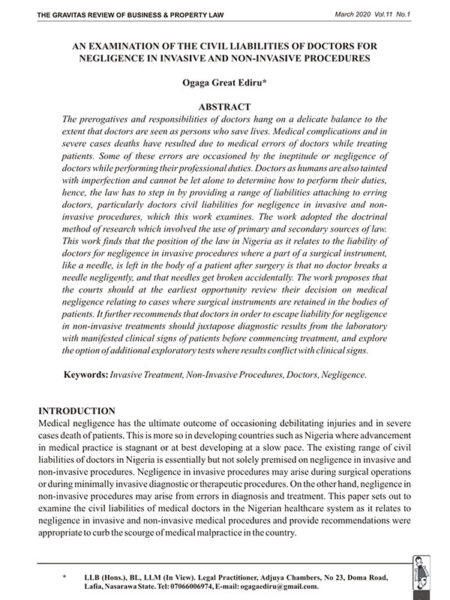
An Examination of the Civil Liabilities of Doctors for Negligence in Invasive and Non-Invasive Procedures
0₦2,500.00Ogaga Ediru of Adjuya Chambers, Lafia, Nasarawa State Nigeria in his article, An Examination of the Civil Liabilities of Doctors for Negligence in Invasive and Non-Invasive Procedures, reviews the liability of doctors for negligence while treating patients. He states that the position of the law in Nigeria as it relates to the liability of doctors for negligence in invasive procedures where a part of a surgical instrument, like a needle, is left in the body of a patient after surgery is that no doctor breaks a needle negligently, and that needles get broken accidentally. Ogaga proposes that the courts should at the earliest opportunity review their decision on medical negligence relating to cases where surgical instruments are retained in the bodies of patients. He recommends that doctors, in order to escape liability for negligence in non-invasive treatments, should juxtapose diagnostic results from the laboratory with manifested clinical signs of patients before commencing treatment, and explore the option of additional exploratory tests where results conflict with clinical signs.
-
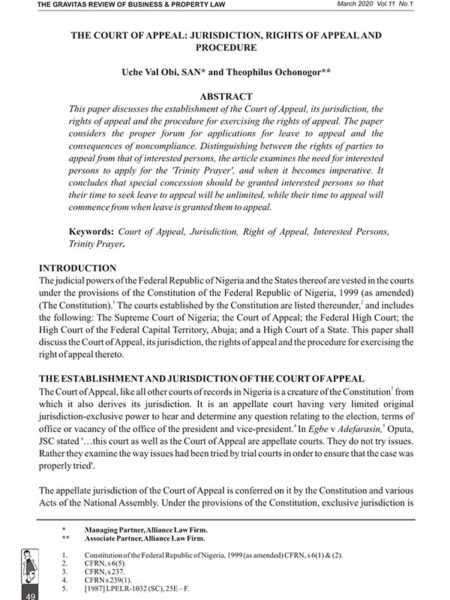
The Court of Appeal: Jurisdiction, Rights of Appeal and Procedure
0₦2,500.00Uche Val Obi, SAN and Theophilus Ochonogor of the Alliance Law Firm in their article, The Court of Appeal: Jurisdiction, Rights of Appeal and Procedure, examine the jurisdiction, rights of appeal and procedure of the Court of Appeal. They consider intriguing issues including appeals by interested persons, whether there is a time limit within which an applicant may seek leave to appeal as an interested party, whether an interested party is exempted from seeking the ‘trinity prayers’ and whether an applicant seeking to appeal as an interested party is to approach the trial high court or the Court of Appeal in the first instance.
-
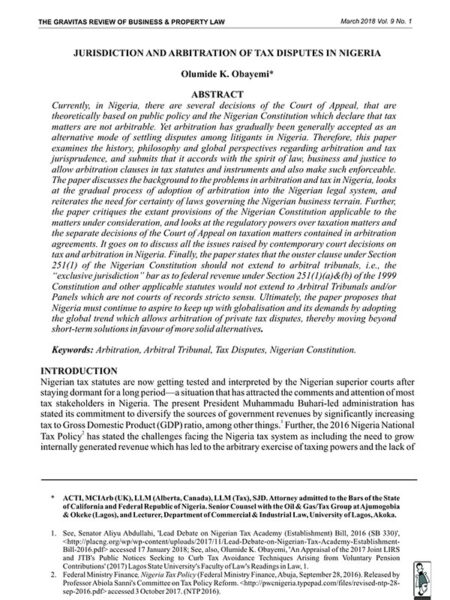
Jurisdiction and Arbitration of Tax Disputes in Nigeria
0₦2,500.00Dr. Olumide Obayemi, of the Department of Commercial & Industrial Law, University of Lagos, and of & Okeke, in his article, “Jurisdiction and Arbitration of Tax Disputes in Nigeria” observes that currently, based on public policy and the Constitution, tax matters are not arbitrable. He examines the history, philosophy and global perspectives regarding arbitration and tax jurisprudence, and submits that it accords with the spirit of law, business and justice to allow arbitration clauses in tax statutes. He reviews the decisions of the Court of Appeal on taxation matters contained in arbitration agreements, and submits that the exclusive jurisdiction conferred on the Federal High Court by Section 251(1)(a)&(b) of the 1999 Constitution should not bar arbitral tribunals which are not courts of records stricto sensu. He concludes that Nigeria must continue to aspire to keep up with and its demands by adopting the global trend which allows arbitration of private tax disputes.
-
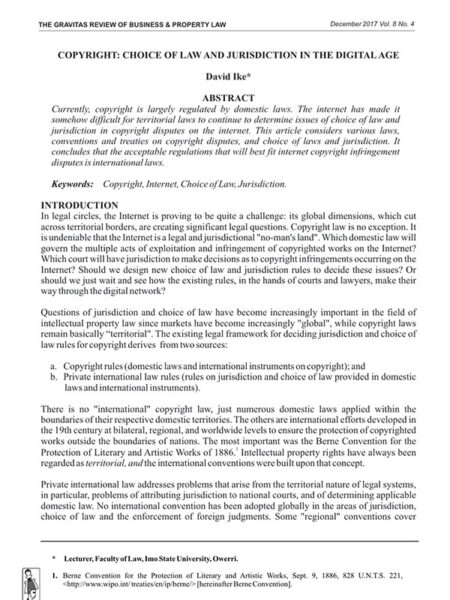
Copyright Choice of Law and Jurisdiction in the Digital Age
0₦2,500.00David Ike of the Imo State University in his article, “Copyright: Choice of Law and Jurisdiction in The Digital Age”, argues that the internet is a legal and jurisdictional “no-man’s land”. He reviews international conventions and treaties on copyright disputes, and concludes that the existing legal framework for deciding jurisdiction and choice of law rules (domestic laws and international instruments on copyright, and private international law rules), are ill-fitted to respond to the needs of copyright infringement on the internet.
-
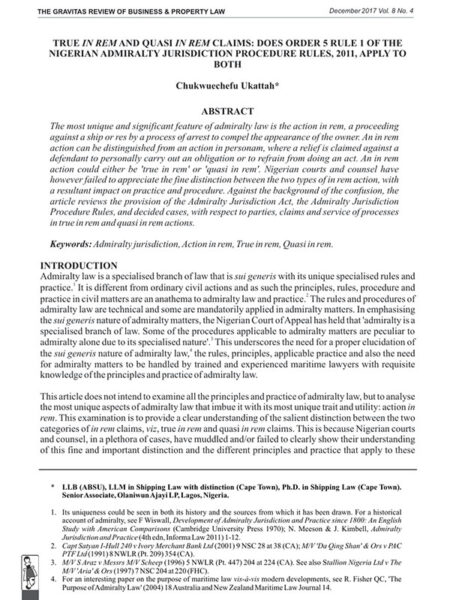
True in Rem and Quasi in Rem Claims: Does Order 5 Rule 1 of the Nigerian Admiralty Jurisdiction Procedure Rules 2011, Apply to Both
0₦2,500.00Dr. Chukwuechefu Ukattah, Senior Associate, Olaniwun Ajayi LP, in his article, “True In Rem and Quasi In Rem Claims: Does Order 5 Rule 1 of the Nigerian Admiralty Jurisdiction Procedure Rules, 2011, Apply to Both?”, notes that an in rem action could either be ‘true in rem’ or ‘quasi in rem’. He argues that Nigerian courts and counsel, have however failed to appreciate the distinction between the two types of in rem action, with a resultant impact on practice and procedure. Against the background of the confusion, he reviews the provision of the Admiralty Jurisdiction Act, the Admiralty Jurisdiction Procedure Rules, and decided cases, with respect to parties, claims and service of processes in true in rem and quasi in rem actions.
The Gravitas Review of Business & Property Law



